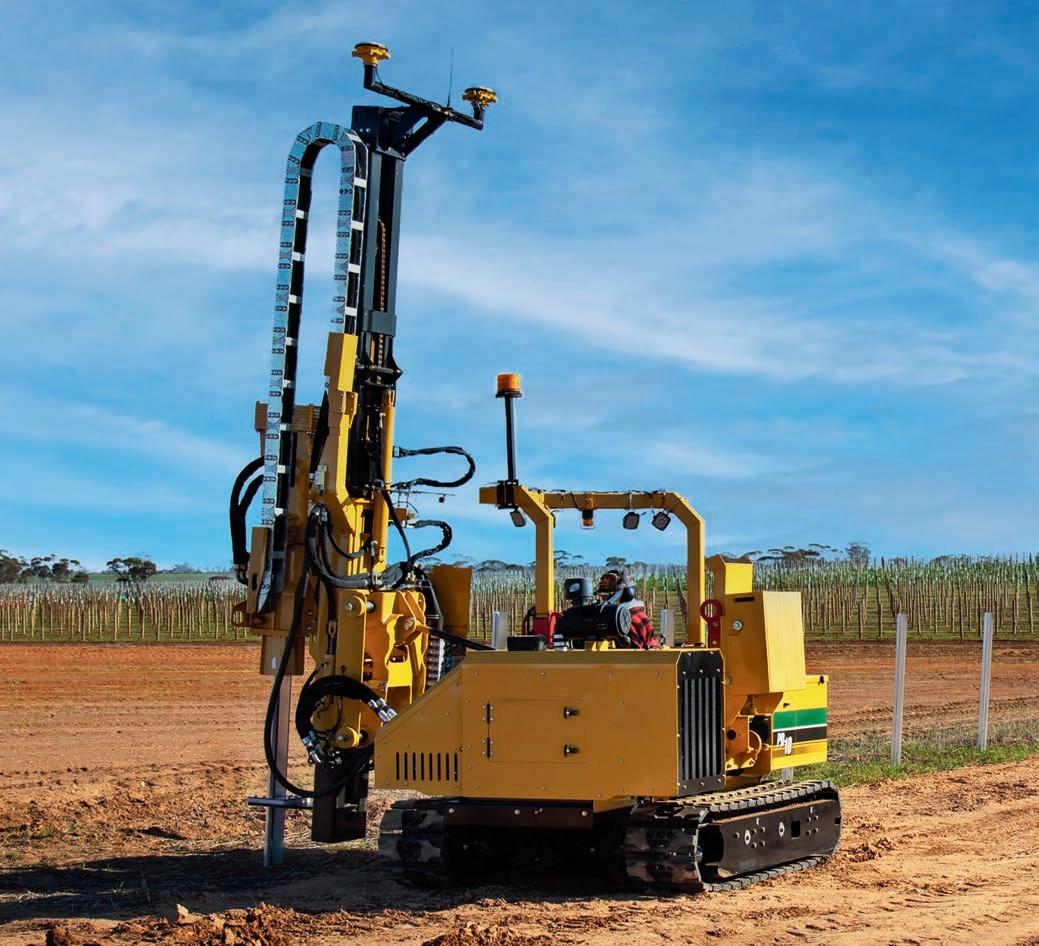
4 minute read
Vermeer PD10 pile drivermeets Trimble GPS John Deere acquires Bear Flag Robotics
News
PILE DRIVER
Replacing pine posts with trellises and end strainers with steel has proven to be a time and cost saver for one Victorian winery
Kicking goals
For Andrew Peace Wines, located in Victoria’s Mallee region, the need to regularly replace the necessary pine posts in its vineyard, plus the difficulty associated with physically removing them, led to it looking for an alternative solution.
The answer was in steel – and a pioneering project that involved Trimble GPS technology and a Vermeer PD10 solar pile driver taking on an Australian-first use.
Using the Trimble GPS technology, the vineyard was mapped out without the need for a surveyor and, crucially, the Vermeer pile driver has been customised to work with the GPS system.
The winery’s viticulture grower liaison Rod Duffy says the new combination of equipment and technology will reduce the total installation time for all the posts from 100 days to 70.
“Previously, we’d work with a consultant to build a farm map to give us an idea on where to place the posts and the topography of the field and would then pass that to the surveyor for them to map out the best spot for the posts to be placed,” he says.
“It would need a team of about 10 people to help put the pine posts in over the course of around 100 days.
“Now, with the Trimble technology, we place the farm map into their program and it tells us where the posts should go.
“Then, the Vermeer PD10 uses that data to place in the steel posts and we only need two labourers to help with the install. A project combining Trimble GPS technology with a Vermeer PD10 solar pile driver has reduced post replacement time at a winery from 100 to 70 days


“The GPS technology with the steel posts is going to be a real time and cost saver for us.”
Duffy also says the winery lost about 12,000 posts last year due to bad weather and spent about $250,000 per year on replacing broken posts, even without factoring in disposal costs for treated pine.
Kevin Gilbert from Vermeer Australia says this is the first time a PD10 has been used for this type of job in Australia.
“This is a big opportunity for the viticulture industry to see what the PD10 is capable of, and that it isn’t just suited for solar panels and posts, but Vermeer Australia can manufacture guides for any type of post,” he says.
“Plus, the PD10 has been customised to work with GPS systems, which will save a whole lot of time, money, and effort when it comes to installing trellises each year for vineyard operators.”
John Deere says its purchase of Bear Flag Robotics will help boost its development of autonomous machinery
ACQUISITION

Deere says its autonomous farm machinery ambitions will get a boost with the acquisition of the Silicon Valley tech company
Bearings secured
John Deere has bought US-based Bear Flag Robotics for US$250 million (A$350.1 million) in a move it says will accelerate its development of autonomous farm technology.
Deere says the acquisition will let it further develop its autonomous agriculture technologies while also supporting the prosperity of the global farming sector.
Bear Flag Robotics, a Silicon Valley start-up founded in 2017, has developed autonomous driving technology that is compatible with existing machines, something which John Deere chief technology officer Jahmy Hindman says will be beneficial for Deere’s strategy.
“Deere views autonomy as an important step forward in enabling farmers to leverage their resources strategically to feed the world and create more sustainable and profitable operations,” says Hindman.
“Bear Flag’s team of talented agriculture professionals, engineers and technologists have a proven ability to deliver advanced technology solutions to market.
“Joining that expertise and experience with Deere’s expertise in autonomy, along with our world-class dealer channel, will accelerate the delivery of solutions to farmers that address the immense challenge of feeding a growing world.”
Bear Flag Robotics boasts a team consisting of agriculture professionals, engineers and technologists, with expertise ranging across areas such as autonomy, sensor fusion, vision, data, software and hardware.
Following the acquisition, Bear Flag will continue to work in Silicon Valley while working with John Deere in order to hasten autonomy and innovation of ag machinery.
Bear Flag Robotics chief executive Igino Cafiero says the organisation – which specialises in food production – will benefit from the deal.
“One of the biggest challenges farmers face today is the availability of skilled labour to execute time-sensitive operations that impact farming outcomes. Autonomy offers a safe and productive alternative to address that challenge head on,” says Cafiero.
“Bear Flag’s mission to increase global food production and reduce the cost of growing food through machine automation is aligned with Deere’s and we’re excited to join the Deere team to bring autonomy to more farms.”
John Deere and Bear Flags Robotics first partnered in 2019 as part of the former’s Start-up Collaborator program – a year-long partnership that saw both parties test innovative technologies with dealers and customers, without any formal business relationship in place.
Through the program, Deere aims to enhance and deepen its interaction with companies while the start-ups also gain affiliation with the agricultural manufacturer.










